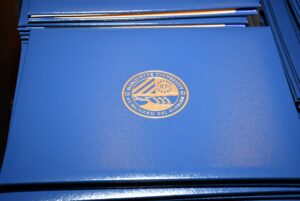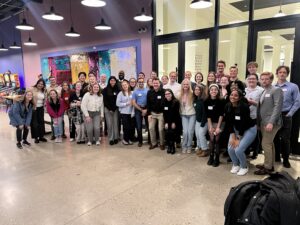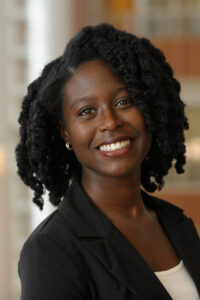Behind the Pomp and Circumstance
This is the ninth in a series of weekly blog posts about the work of Marquette Law School’s Office of Student Affairs. The previous post and links to all prior posts from this series can be found at this link.
 The Law School’s largest event of the year, by far, is graduation.
The Law School’s largest event of the year, by far, is graduation.
Or, as you may see it advertised, the Hooding and Commencement Ceremony. We use a variety of terms interchangeably to refer to the event, which historically has taken place on the third Saturday in May. Graduates walk across the stage and receive their law degree.
That sounds so sterile for such a meaningful event, doesn’t it? In fact—in truth—this event is rich and meaningful, both for our graduates, their families, friends, and guests and for those of us who work at the Law School—faculty and staff. It is inspiring to see students, who were nervous and maybe even a little scared when we first greeted them at Orientation, walk confidently across the stage at Commencement. We get to cheer for students who have gone through hardship triumph as they pass this important finish line. We celebrate not just how far all of our graduates have come but also the bright futures that await them.
The purpose of this blog post is to take you behind the scenes of graduation as it comes together.
The Law School’s Office of Student Affairs coordinates the “show,” but on the day-of, it’s an all-hands on deck production, which includes our Events, Facilities, and Tech teams, our Admissions Office, and a number of colleagues from the Law Library.
Planning for graduation starts before the academic year even begins (there’s a mark of our confidence). The prior spring (i.e., that of most graduates’ 2L year), we’re already in contract negotiations with the venue for the following May. And the dean is often considering and sending out an invitation to a potential guest speaker a year ahead.
Each year, we assess and revise, with an eye toward enhancing the experience for our graduates and their guests. Here are just a handful of those seemingly small details to which we’ve given a lot of thought:
- Regalia Pickup and Graduate Fair
- Graduation itself almost can be said to start before the day of graduation. As busy as the run up to graduation is for me personally (someone must go through all the regalia orders and ensure that tickets are counted and everything is in order), the Regalia Pickup and Graduate Fair, in Eckstein Hall a couple of days before graduation, is honestly one of my own favorite days. This has been a post-COVID initiative that might seem very business-oriented and straightforward (graduates need to get their regalia and tickets somehow), but we wanted to make sure to convey the message to our graduates that even when they leave us, they are not alone. The Law Alumni Association Board, the State Bar of Wisconsin, and the Milwaukee Bar Association all join in to welcome our soon-to-be new lawyers and help them get connected to resources and networks that will allow them to continue to be successful after leaving their student days behind.
- Requesting a verbal recording of graduate names
- We know how important it is to hear a graduate’s name said correctly. It’s why we request that graduates submit a recording of their names in advance. Our name reader then reviews the names in advance and does her best to deliver the memorable moment for the graduates and their families.
- Seating graduates in alphabetical order
- Why would we insist on having graduates seated and called on stage in alphabetical order by last name? It is so that families, friends, and guests of our law student know when to expect their graduate to walk across the stage and be hooded, and they don’t have to worry about sneezing and missing the big moment. (I won’t even tell you what happens to our elaborate seating charts when a graduate cancels last minute!)
- Celebratory reception after the ceremony
- Like a wedding, commencement can be a whirlwind experience. Looking back at my own graduations, I even have some regrets about missing out on photos with some classmates or missing an opportunity to introduce a mentor to my family because everyone scattered immediately after the ceremony. That’s why we have a reception in the rotunda outside of the theater, immediately following the formal ceremony. It gives everyone the chance to breathe a bit, mingle, socialize, and capture those opportunities with graduates, their families, friends, and our faculty and staff. (Pro tip: The dean likes being asked to join a photo.)[*]
Again, those are just a few examples of details requiring our attention. If all goes to plan (and it always seems to), we’ve created a two-hour (in other words, brief, for a commencement ceremony) quality event that our graduates and their guests will remember fondly. Although you may hear me say that graduation planning is a well-oiled machine, it’s only because we take so much care throughout the year to make sure all the little details are just right (I have the spreadsheets to prove it). Even those little details have major impacts.
[*] Beyond graduation, providing professional photography is another post-COVID initiative that we hope makes even more special the swearing-in or admission ceremony, which takes place in Madison the Monday after commencement. The Law School reserves an awesome photographer to capture each of our newest Marquette lawyers signing Wisconsin’s roll of attorneys. It’s always a treat to share these photos of this “magic moment.”


